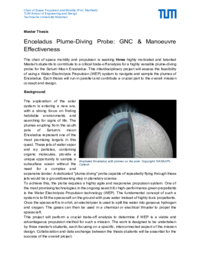Enceladus Plume-Diving Probe: GNC & Manoeuvre Effectiveness
- Institute
- Lehrstuhl für Raumfahrtantriebe
- Type
- Master's Thesis
- Content
- theoretical constructive
- Description
The chair of space mobility and propulsion is seeking three highly motivated and talented Master's students to contribute to a critical trade-off analysis for a highly versatile plume-diving probe for the Saturn Moon Enceladus. This interdisciplinary project will assess the feasibility of using a Water-Electrolysis Propulsion (WEP) system to navigate and sample the plumes of Enceladus. Each thesis will run in parallel and contribute a crucial part to the overall mission concept and design.
Background
The exploration of the solar system is entering a new era, with a strong focus on finding habitable environments and searching for signs of life. The plumes erupting from the south pole of Saturn's moon Enceladus represent one of the most promising targets in this quest. These jets of water vapor and icy particles, containing organic molecules, provide a unique opportunity to sample a subsurface ocean without the need for a complex and expensive lander. A dedicated "plume-diving" probe capable of repeatedly flying through these jets would be a groundbreaking step in planetary science.
To achieve this, the probe requires a highly agile and responsive propulsion system. One of the most promising technologies in the ongoing search for high-performance green propellants is the Water Electrolysis Propulsion technology (WEP). The fundamental concept of such a system is to fill the spacecraft on the ground with pure water instead of highly toxic propellants. Once the spacecraft is in orbit, an electrolyser is used to split the water into gaseous hydrogen and oxygen. The gases can then be used in a chemical or electrical thruster to propel the spacecraft.
This project will perform a crucial trade-off analysis to determine if WEP is a viable and advantageous propulsion method for such a mission. The work is designed to be undertaken by three master's students, each focusing on a specific, interconnected aspect of the mission design. Collaboration and data exchange between the thesis students will be essential for the success of the overall project.
Thesis 3/3: GNC & Manoeuvre Effectiveness
This thesis will focus on the Guidance, Navigation, and Control (GNC) aspects of the mission, assessing how effectively the probe can perform its mission-critical maneuvers.
Tasks:
- Defining the thrust-to-mass ratio and minimum impulse bit required for precise plume-pass guidance and emergency abort maneuvers.
- Utilizing the environmental disturbance data from Thesis 2/3 to conduct envelope simulations and assess the control system's performance under various conditions.
- Comparing the maneuver success margins and agility of a WEP-propelled probe against those of conventional systems.
- Output: Success envelopes, a control requirement sheet, and a comparative assessment of the agility and robustness of each propulsion option. Documentation and presentation of the work.
Contact
Fabian Riegelsberger, M.Sc.E-Mail: fabian.riegelsbergertum.de
- Requirements
1. Introduction to Spaceflight
2. Rocket Propulsion I
3. Rocket Propulsion II Design Challenge OR Spacecraft Propulsion Design Challenge
- Possible start
- 01.10.2025
- Contact
-
Fabian Riegelsberger, M.Sc.
Room: Ottobrunn, Carolin-Herschelstr. 100 3.OG
fabian.riegelsbergertum.de - Announcement
-
